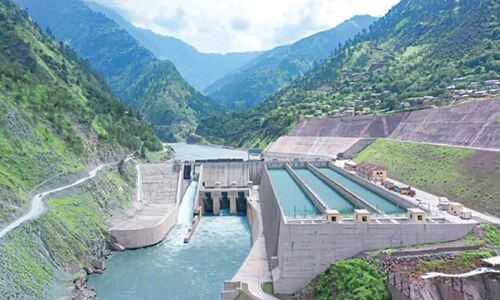As financial constraints mount, the over-ambitious planned federal development spending is being slashed, facilitated by a permanent policy shift. In a briefing, the Planning and Development Ministry is reported to have informed Minister Ahsan Iqbal that the limited fiscal space does not allow for the funding of a huge development portfolio.
The ministry has suggested that projects of provincial nature be dropped from the Public Sector Development Programme (PSDP). It has identified 764 uplift schemes costing some Rs2.3 trillion which it has recommended be abandoned. A summary has also been sent by the ministry to the National Economic Council with a request to ban the approval of new federally funded provincial projects, except those that fall in the notified underdeveloped areas of the country.
It is not clear at this point whether these abandoned projects would be transferred to the federating units. To ensure that money spent on these projects does not go waste, the provinces can pick and choose from the schemes and set their own priorities for their implementation according to their socio-economic needs.
One may also point here that the recent public agitations for the basic rights of Gwadar including essentials like water have fully demonstrated that the federally sponsored schemes do not necessarily benefit citizens at the grassroots in the most economically backward areas. Experts say it is due to bad governance and institutional decay.
Instead of launching federal projects in under-developed areas, it would be more appropriate that the National Finance Commission be activated to update the horizontal distribution of resources and provide more funds from the divisible pool for less developed regions
Instead of launching federal projects in under-developed areas, it would be more appropriate that the National Finance Commission (NFC) be activated to update the horizontal distribution of resources and provide more funds from the NFC divisible pool for less developed regions.
The belated shedding of responsibility for undertaking provincial projects makes it all the more necessary for the federal government to reduce gradually its growing dependence on provinces’ budget surpluses to manage the consolidated fiscal balance owing to rising federal fiscal deficits. Earlier, it may be recalled, that the PTI government had also transferred some federal government departments with duplicating functions to the provinces as provided by the Eighteenth Constitutional Amendment.
One of the reasons for slow economic development has been that the principle of participatory democratic federalism was not strictly observed. With the government’s focus shifting to macroeconomic stability owing to surging fiscal and current account deficits for which access to the International Monetary Fund credit facility with its attached conditionality has become an imperative, the planning ministry is considering a deep cut in federal development spending. It has recommended winding up 36 per cent of the 1,169 schemes with the overall estimated cost of Rs6.3 trillion, reducing the overall PSDP size to Rs4tr.
However, concerns have arisen owing to certain reported developments concerning the future of the social uplift and common welfare projects started by the PTI government. And analysts insist that any uncertainty in this matter should be dispelled and the government should commit to continuing social safety programmes already in place.
They also recall that governments time and again, for political reasons, try to shut down, upend or gut even some of the better initiatives taken by their predecessors The government, working for national unity, must balance its books but not at the expense of the vulnerable.
For decades it has been a practice that the axe first falls on development spending when macro-economic imbalances became unmanageable. It results in delays in the execution of projects, escalates their costs and affects their financial viability. It also creates gaps and dis-harmonises an integrated approach to economic development. There is a lot of unaccountable wastage of funds in the process. And fiscal federalism suffers because the constitutionally guaranteed rights and responsibilities of the three tiers of government are violated and curb its organic growth.
The federation should shed all its functions and responsibilities that lie in the jurisdiction of the federating units. There is much room for that. Prime Minister Shahbaz Sharif has taken the right decision by agreeing to Sindh’s demand to restore the management of three hospitals earlier run by the province. Similarly, keeping federal principles in view, whatever can be managed at the district level should be excluded from the domain of the sub-federations.
According to a United Nations Development Programme study, decentralisation is the logical application of core characteristics of good governance at sub-national and local levels. Despite various forms of devolution worldwide, good governance, better service delivery and enhanced accountability have remained the common objective.
To quote scholar and political scientist Mohammad Waseem, local bodies in Pakistan derive their strength from an acute dependence on state legitimacy and resources.
However, it may be pointed out that there is a much more heightened national awareness than ever before about the need for financial and administrative empowerment of local governments. The good news is that the country appears to be moving away from centralisation at the cost of democracy and initial steps for strengthening participatory federalism are visible on the horizon.
Published in Dawn, The Business and Finance Weekly, May 9th, 2022















































Dear visitor, the comments section is undergoing an overhaul and will return soon.